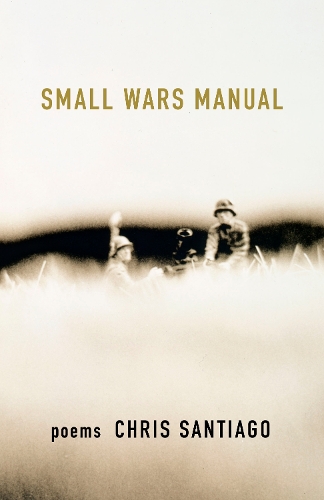
Small Wars Manual: Poems
(Paperback)
Publishing Details
Small Wars Manual: Poems
By (Author) Chris Santiago
Milkweed Editions
Milkweed Editions
23rd July 2025
United States
Classifications
General
Non Fiction
Modern and contemporary poetry / poems
811.6
Physical Properties
Paperback
144
Width 139mm, Height 215mm
Description
From award-winning poet Chris Santiago, a far-reaching collection of erasures and original poems examining the long shadow of American militarism and imperialism.
Stemming in part from a disturbingly mundane military document of the same name, Small Wars Manual is a how-to for imperialism that critically dismantles itself with each passing line, "a pidgin // containing elements // of animus and // insubordination." In its wake, the very boundaries of oppression and resistance, art and justice, and power and truth are exploded.
Highly conceptual yet gut-wrenching, this meticulous and visionary masterpiece of erasure poetry and other forms sinks into the cold mechanics of American warfare in the Philippines and Vietnam to reveal a brutal rhetoric. In more autobiographical sections, Chris Santiago's own Filipino immigrant background reveals hard-lived experiences, where "stars can guide // either bayonets // or refugees" and "even small wars waged // on the living room floor" cause trepidation and harm.
This righteous collection redeems the vulnerable from the aggressors-empire, army, their systems and tools-and transforms everything in the process. In the hands of Santiago, the deconstructive becomes the eviscerating, condemning all wars that upend countries and mark generations. Here are shining poems that make shelter of chaos, by one of the most skillful and intrepid poets writing today.
Reviews
Praise for Tula
Chris Santiagos poems encourage us to see English the way an immigrant doesas something different, to be broken and remade. Through this difference in language, Santiago makes readers aware of both the poets otherness and their own. This is a book that both transports us and transforms us.Viet Thanh Nguyen, author of A Man of Two Faces
Tula: a ruined Toltec capital in Nahuatl, yet in Chileno, slang for cock. Also nightshade, bellflower, and in English, square-rigged for new continents. The mysteries of language, the vagaries of sound and syntax, the reverberations of alternate meanings as words flood the ear: these are the subject of Santiagos gorgeous debut collection. It was homegrown & inequitable: this poets imagination, testing at every moment the relationship of his American present to his Filipino familys past, creates a rich complex of memory and desire.Marjorie Perloff, author of Differentials: Poetry, Poetics, Pedagogy
Like it or not, writes Santiago, the Dead keep coming. This haunted (and deeply haunting) collection makes us aware of the spectral legions who might otherwise be lost to historical feeling in our time. Interweaving personal reflections with diasporic etymologies, a fractured family history, and close ecological observation, Tula discloses the many ways that our nations incursions into the Pacific Rim region may contribute to the political unconscious of contemporary American poetry. Here, the immense magnitudes and buzzing minutiae of a world resonate together in music the stars would make if they / were as small as they looked.Srikanth Reddy, author of Underworld Lit
In Tulathe word for poem in TagalogSantiago pursues the language and experience of the immigrant, engaged with dreams, wonder, oppression, and heartbreak. Exquisitely lyric, fierce and delicate, the poems often are fractured in form and charged with suffering. Whether set in Manila, Japan, or Minnesota, these poems, lit with imagination, reveal what poetry can be in life.Patricia Kirkpatrick, author of Blood Moon
In a hypnotic blend of languages and lands, Tula captures the voice of a world we are happy to inhabit. The lines are taut and spare; the scope is both intimate and communal. What surprises me most is the ability to move seamlessly between the exterior world to the depths of the interiority of these speakers. Its not so much that the language here is new as that the message is so urgently original. Reading these poems feels as if a door opens & your name / is called & all at once you arent cut off anymore / from the rest of the world: you are / the rest of the world.A. Van Jordan, author of When I Waked, I Cried To Dream Again
Author Bio
Chris Santiago's debut collectionTulawas selected by A. Van Jordan as the winner of the Lindquist & Vennum Poetry Prize and was a finalist for the Minnesota Book Award. His poems have appeared inPoetry Magazine, Copper Nickel, Conduit, The Academy of American PoetsPoem-a-Day, and American Public Media'sThe Slowdown. His collaboration with composer Lembit Beecher and ethnographer Todd Lawrence,Say Home, was commissioned by the Saint Paul Chamber Orchestra and received its world premiere in 2019. A Loft Poetry Mentor and Fellow of the McKnight Foundation, the Mellon Foundation/ACLS, and Kundiman, he received his PhD from the University of Southern California and recently joined the Faculty of the School of Critical Studies at CalArts in Santa Clarita, CA. He lives in Pasadena.
